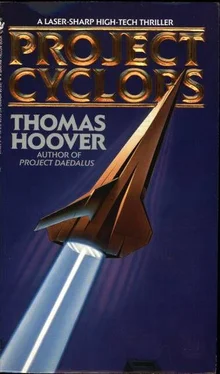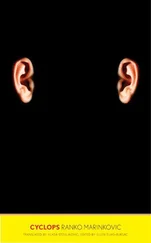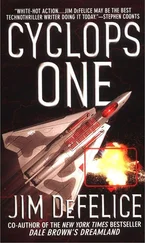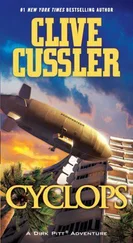Thomas Hoover - Project Cyclops
Здесь есть возможность читать онлайн «Thomas Hoover - Project Cyclops» весь текст электронной книги совершенно бесплатно (целиком полную версию без сокращений). В некоторых случаях можно слушать аудио, скачать через торрент в формате fb2 и присутствует краткое содержание. Жанр: Триллер, на английском языке. Описание произведения, (предисловие) а так же отзывы посетителей доступны на портале библиотеки ЛибКат.
- Название:Project Cyclops
- Автор:
- Жанр:
- Год:неизвестен
- ISBN:нет данных
- Рейтинг книги:4 / 5. Голосов: 1
-
Избранное:Добавить в избранное
- Отзывы:
-
Ваша оценка:
- 80
- 1
- 2
- 3
- 4
- 5
Project Cyclops: краткое содержание, описание и аннотация
Предлагаем к чтению аннотацию, описание, краткое содержание или предисловие (зависит от того, что написал сам автор книги «Project Cyclops»). Если вы не нашли необходимую информацию о книге — напишите в комментариях, мы постараемся отыскать её.
Project Cyclops — читать онлайн бесплатно полную книгу (весь текст) целиком
Ниже представлен текст книги, разбитый по страницам. Система сохранения места последней прочитанной страницы, позволяет с удобством читать онлайн бесплатно книгу «Project Cyclops», без необходимости каждый раз заново искать на чём Вы остановились. Поставьте закладку, и сможете в любой момент перейти на страницу, на которой закончили чтение.
Интервал:
Закладка:
The organization had checked out the man extensively, as they did all new members, and ARM's computer probably knew as much about him as he did himself. It was an oddball story: son of a famous Penn archaeologist, he had been by turns an archaeologist himself, a yachtsman, and a low-level spook. After he finished his doctorate at Yale and had taught there for two semesters, he had published his dissertation-claiming the famous Palace of Minos in Crete was actually a hallowed necropolis-as a book. It had caused a lot of flap, and to get away for a while, he had taken a vacation in Nassau to do some big-game fishing. Before the trip ended, he had bought an old forty-four-foot Bristol sailboat in need of massive restoration. It was a classic wooden vessel, which meant that no sooner had he finished varnishing the thing from one end to the other than he had to start over again.
But he apparently liked the life. Or maybe he just enjoyed giving the academic snakepit a rest. The computer could not get into his mind. Whatever the reason, however, the sailboat, which had begun as a diversion, soon became something else. By the time he had finished refurbishing her, she was the most beautiful yacht in the Caribbean, and everybody around Nassau wanted a shot at the helm. He had a charter business on his hands.
Then his saga took yet another turn. The Nassau Yacht Club, and the new Hurricane Hole Marina across the bridge on Paradise Island, comprised a yachting fraternity that included a lot of bankers. Nassau, after all, had over three hundred foreign commercial banks, and its "see no evil" approach to regulation and reporting made it a natural haven for drug receipts. With a lot of bankers as clients, before long Vance knew more than any man should about offshore money laundering. He did not like that part of the scene, but the bankers loved his yacht, and they paid cash.
As he once told it, he eventually found out why. At least for one of them. One sunny afternoon the vice president of the European Consolidated Commercial Bank, an attractive blond-haired young Swiss mover known to Vance only as "Werner," was docking The Ulysses at Hurricane Hole, bringing her back from a three-day sail, when the DEA swooped down, flanked by the local Bahamian police. Armed with warrants, they searched the boat and soon uncovered fifty kilos of Colombian export produce. Seems "Werner" had sailed The Ulysses to some prearranged point and taken it on, planning to have divers stash the packages in the rudder-trunk air pocket of one of the giant cruise ships that tied up at Nassau's four-berth dock. Vance heard about it when he got a call from the harbormaster advising him that his prized Bristol had just been seized as evidence in a coke bust. He was out of business.
That afternoon Bill Bates had coincidentally flown in on Merv Griffin's Paradise Island commuter airline and come over to Hurricane Hole, wanting to charter The Ulysses for a week of sailing and fishing. Vance had to inform him his favorite Bahamian yacht had just acquired a new owner.
Bates could not believe he had flown into such a screw-up. Vance was having his own problems with disbelief, too, but paying the mortgage was his more immediate concern. The DEA had the boat, but before long he wouldn't have to worry about that any more. That problem, and the boat, would soon belong to the mortgage-holding bank over on Bay Street.
He immediately slapped the DEA with a two-million-dollar lawsuit, just to put on some heat. His lawyer claimed he didn't have a hope in hell.
But two weeks later a Bahamian judge, after lunch with the mortgage-holding banker, summarily ordered the DEA to release the yacht. To Vance's surprise, the U.S. Drug Enforcement Administration cheerfully complied and turned it over the same afternoon. He immediately dropped the lawsuit, writing off the whole affair as a triumph for truth, justice, and the Bahamian way of banking. Or so it seemed.
Only later did he unearth the Byzantine complexities of what really had happened. The affair had somehow come to the attention of The Company, and there had been a flurry of phone calls to the DEA in New Orleans from Langley, Virginia. A month later, while he was in the States attending a Yale alumni function, he'd found himself talking to two earnest Washington bureaucrats, who congratulated him on beating the system. Huh?
They then described their need for a "financial consultant" in Nassau, somebody who knew the right people. Maybe he would consider taking the job; it could merely be a favor for-they hinted broadly-a favor.
Here was the problem: the CIA desperately needed help in trying to keep track of the cocaine millions being laundered through Nassau's go-go banks. The Company wanted some local assistance getting certain off-the-record audits, from clean bankers who were tired of Nassau being a haven for dirty cash.
He hated drugs and drug money, so he had seen nothing wrong with the idea. He even ended up training some greenhorns out of Langley in the subtle art of tracing wire transfers. Two years later he got his payoff. They formed their own in-house desk to do what he had been doing and retired him. He was, it turned out, too successful.
But the word on such skills got around, and two months later Pierre Armont had approached him about joining ARM. They needed somebody good at tracing hot money, frequently the most reliable trail of a terrorist operation, and everybody close to the business had identified him as the best around.
By that time he had formally incorporated a charter operation in Nassau as Windstalker, Ltd., with three boats, three mortgages, and a big monthly nut. So he had signed on, only later discovering that along with ARM's extra cash came a lot of travel, many responsibilities, and occasional death threats. He took them seriously enough to start carrying his own protection, a chrome-plated 9mm Walther. Armont approved.
Vance had always been well paid. It was expected. Anybody who hired ARM-usually because there was nowhere else left to turn-knew the best did not come cheap. A good two-week op could pull down fifty thousand pounds sterling for every man on the team, which was why the boys drove BMWs and drank twelve-year-old Scotch. But no client ever complained about the price. Or if they did, they didn't complain to Pierre. Payment was always cash, half up front and the rest on delivery. Any client who welshed on the follow-through would be making a very ill-considered career decision.
He pulled the blinds and turned to his desk. Faxes sent via ARM's secure, encrypted system covered the surface. The team was coming together. His secretary Emile, a young Frenchman who came in mornings and worked in the next room, had already booked the necessary flights. By 1800 hours tomorrow everybody would be assembled in Athens and ready to insert.
Armont intended to lead the operation himself… unless Vance, as the man on the ground, proved the logical choice. Since he was already in place, always the best location, he would in any case have to be point man.
He had talked the job over with "Hans" in Frankfurt at 1030 hours, just after he had gotten the call from Athens, and together they had picked six operatives. Vance would make seven. He calculated that would be plenty.
"Hans" was the nom de guerre of a former GSG-9, Germany's green-beret-sporting Grenzschutzgruppen 9. GSG-9, headquartered at St. Augustin just outside Bonn, had a nine- million-dollar underground training range that included a communications and intel unit, aircraft mockups, an engineer unit, a weapons unit, an equipment unit, a training unit, and a strike unit. In his fifteen years with GSG-9, Hans had been known to achieve 95 percent accuracy with an H amp;K MP9 when firing from a moving vehicle or even rappelling down a rope from a hovering chopper. Now retired, he brought to ARM many talents: as well as participating in the on-site op, he usually acted as liaison officer because of his flawless English.
Читать дальшеИнтервал:
Закладка:
Похожие книги на «Project Cyclops»
Представляем Вашему вниманию похожие книги на «Project Cyclops» списком для выбора. Мы отобрали схожую по названию и смыслу литературу в надежде предоставить читателям больше вариантов отыскать новые, интересные, ещё непрочитанные произведения.
Обсуждение, отзывы о книге «Project Cyclops» и просто собственные мнения читателей. Оставьте ваши комментарии, напишите, что Вы думаете о произведении, его смысле или главных героях. Укажите что конкретно понравилось, а что нет, и почему Вы так считаете.












